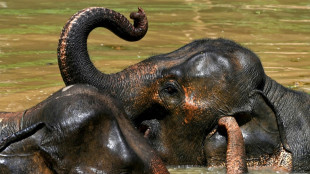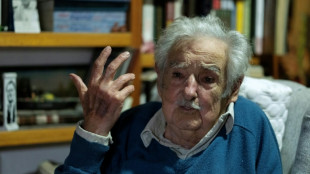
-
 Icelanders head to the polls after government collapse
Icelanders head to the polls after government collapse
-
England strike twice to have New Zealand in trouble in first Test

-
 Researchers analyse DNA from dung to save Laos elephants
Researchers analyse DNA from dung to save Laos elephants
-
North Korea's Kim, Russian minister agree to boost military ties

-
 Brook's 171 gives England commanding 151-run lead over New Zealand
Brook's 171 gives England commanding 151-run lead over New Zealand
-
Kamala's coda: What's next for defeated US VP Harris?

-
 Chiefs hold off Raiders to clinch NFL playoff berth
Chiefs hold off Raiders to clinch NFL playoff berth
-
Australia's Hazlewood out of 2nd India Test

-
 Trudeau in Florida to meet Trump as tariff threats loom
Trudeau in Florida to meet Trump as tariff threats loom
-
Jihadists, allies breach Syria's second city in lightning assault

-
 Trudeau in Florida to meet Trump as tariff threats loom: media
Trudeau in Florida to meet Trump as tariff threats loom: media
-
Hunter shines as Hawks top Cavs again

-
 Southampton denied shock Brighton win by dubious VAR call
Southampton denied shock Brighton win by dubious VAR call
-
Alarm over high rate of HIV infections among young women, girls

-
 Swiss unveil Euro 2025 mascot Maddli
Swiss unveil Euro 2025 mascot Maddli
-
Bears fire coach Eberflus after latest agonizing NFL defeat

-
 Rallies mark one month since Spain's catastrophic floods
Rallies mark one month since Spain's catastrophic floods
-
Arnault family's Paris FC takeover completed

-
 Georgian police stage new crackdown on pro-EU protestors
Georgian police stage new crackdown on pro-EU protestors
-
'We're messing up:' Uruguay icon Mujica on strongman rule in Latin America

-
 Liverpool dealt Konate injury blow
Liverpool dealt Konate injury blow
-
Van Nistelrooy appointed Leicester manager

-
 Verstappen brought back to earth in Doha after F1 title party
Verstappen brought back to earth in Doha after F1 title party
-
Global wine output to hit lowest level since 1961

-
 Norris boosts McLaren title hopes with sprint pole
Norris boosts McLaren title hopes with sprint pole
-
Big-hitting Stubbs takes satisfaction from grinding out Test century

-
 Romania recounts presidential ballots as parliamentary vote looms
Romania recounts presidential ballots as parliamentary vote looms
-
French skipper Dalin leads as Vendee Globe passes Cape of Good Hope

-
 Chelsea not in Premier League title race, says Maresca
Chelsea not in Premier League title race, says Maresca
-
Brazil's Bolsonaro aims to ride Trump wave back to office: WSJ

-
 France requests transfer of death row convict held in Indonesia: minister
France requests transfer of death row convict held in Indonesia: minister
-
'Mamie Charge': Migrants find safe haven in Frenchwoman's garage

-
 Iconic Uruguayan ex-leader hails country's swing left as 'farewell gift'
Iconic Uruguayan ex-leader hails country's swing left as 'farewell gift'
-
Thousands rally in Georgia after violent police crackdown on pro-EU protesters

-
 Shared experiences make Murray 'perfect coach', says Djokovic
Shared experiences make Murray 'perfect coach', says Djokovic
-
Iran, Europeans to keep talking as tensions ratchet up

-
 Inflation-wary US consumers flock to 'Black Friday' deals
Inflation-wary US consumers flock to 'Black Friday' deals
-
France shows off restored Notre Dame after 'impossible' restoration

-
 South African bowlers strike after Sri Lanka set big target
South African bowlers strike after Sri Lanka set big target
-
Namibia reopens polls after election chaos in ruling party test

-
 Georgia police arrest dozens in clashes with pro-EU protesters
Georgia police arrest dozens in clashes with pro-EU protesters
-
US stocks rise on Black Friday

-
 Leclerc on top for Ferrari in Qatar GP practice
Leclerc on top for Ferrari in Qatar GP practice
-
Jihadists, allies enter Syria's second city in lightning assault

-
 Amorim puts faith in Mount to turn around Man Utd career
Amorim puts faith in Mount to turn around Man Utd career
-
Guardiola will not 'run' from Man City rebuild

-
 Assisted dying campaigners, opponents rally at UK parliament
Assisted dying campaigners, opponents rally at UK parliament
-
Durable prop Healy set to carve name in Irish rugby history

-
 Macron unveils Notre Dame after 'impossible' restoration
Macron unveils Notre Dame after 'impossible' restoration
-
Traumatised Spain marks one month since catastrophic floods


Goodbye Tito? Tomb at risk as Serbs argue over Yugoslav legacy
In a move akin to kicking Lenin out of Moscow's Red Square, the mayor of Belgrade wants to rid the Serbian capital of the tomb of Tito, the socialist leader who held Yugoslavia together for decades.
Nationalist Aleksandar Sapic wants to send Tito -- the wartime resistance leader who liberated the country from the Nazis -- back to his native Croatia despite his tomb in the Museum of Yugoslavia attracting 120,000 visitors a year.
Sapic insists Tito has to go if Serbia is to "move away from communism", and wants to turn his mausoleum into a museum of Serbian history.
"The communist regime has literally brought nothing good to the Serbian people," said the mayor, who instead wants to put up a statue to a controversial Chetnik leader who fought against Tito during World War II.
The call has reopened bitter disputes over the bloody German occupation when two rival resistance groups fought the Nazis, though many Chetnik groups ended up cooperating with the Axis forces.
Tito's communist Partisans finally prevailed over the royalist and nationalist Chetniks, whose leader Dragoljub Mihailovic was executed in 1946 for war crimes and collaboration with the Nazis.
Serbia's nationalist government later rehabilitated the Chetniks with a 2003 law giving the two movements equal status. Mihailovic's convictions were overturned in 2015, with judges dismissing his original trial as "political".
- Yugo nostalgia -
The mayor has so far only floated the idea of removing the tomb, with the Croatian village of Kumrovec -- where Tito was born Josip Broz in 1892 -- already applying to take his remains if Belgrade no longer wants them.
Several towns and cities in Bosnia and Montenegro are also keen to have him in a sign of the nostalgia that still surrounds Tito in the former Yugoslavia, which collapsed a decade after his death in 1980 in a series of bloody wars.
Serbia's president, Aleksandar Vucic -- the founder of Sapic's party -- is less keen to see Tito go, however, saying the tomb is part of the country's heritage.
Historian Milovan Pisarri told AFP that the mayor's controversial move was another step in a long ideological battle over the disputed legacy of World War II.
"It's simply a continuation of what started around 20 years ago, when this new nationalist ideology entered institutions and succeeded in turning a collaborator into an anti-fascist," he said, referring to Mihailovic.
Sapic has already asked permission to put to a statue of the Chetnik leader near one of Belgrade's main squares and also wants to remove the tombs of four communist partisans from the city's largest park.
But Mihailovic's grandson Vojislav, an MP for the opposition monarchist party, dismissed Sapic's efforts as "insincere" and "manipulative", accusing the ruling party of using his ancestor for political gain.
"While I fully support the idea [of a statue], I question their true intentions," said Mihailovic, who -- like many Serbs -- regards Tito as a dictator.
Even today, his grandfather's face adorns T-shirts and walls in Belgrade. The Chetnik movement enjoyed a resurgence in popularity as Yugoslavia collapsed in the 1990s, with some Serbian paramilitary groups adopting Chetnik nicknames, symbols and their signature long beards.
- History 'can't be erased' -
Tito's tomb is not the only symbol of the former Yugoslavia under threat in Serbia's capital.
The renowned Yugoslavia Hotel -- once a source of national pride -- is soon to make way for a luxurious new skyscraper on the banks of the Danube complete with a casino and dock.
Donald Trump's son-in-law Jared Kushner is also planning to build another luxury hotel on the site of the former Yugoslav army headquarters, which was badly damaged in the 1999 NATO bombing of Belgrade.
Its Brutalist design was meant to evoke a canyon on the River Sutjeska where the Partisans made a key breakthrough against German forces in 1943.
In the latest surreal twist in the culture war, the mayor said he also wants to change the colour of Belgrade's new buses from "socialist" red to the blue of the mediaeval Nemanjic dynasty.
For Pisarri, the changes are nothing short of an attempt to erase all trace of Yugoslavia and everything it represented. "But Yugoslavia cannot be erased from people's memory," the historian insisted.
J.Horn--BTB
